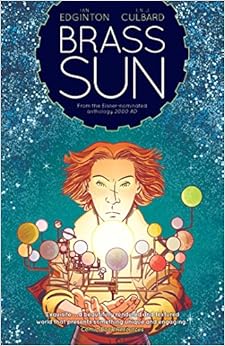
I have not been as engaged with 2000 AD in the last couple of years as I had been for a really, really long time. Part of that's because while the comic is, bluntly, the very best comic that money can buy, there's been a certain staleness to the procedural routine of it, and I've become bored, not with the stories, but with the experience of how they're presented. I never wanted to turn into "that fan" who's constantly moaning about how imperfect it is not making special snowflakes like me happy as clams (although I sort of did), so I kind of shut up about things. I just read quietly to myself these days, mainly.
That said, when a series comes along that partially addresses one of my complaints, I feel like I owe it to the comic to brush myself off and tell the world how good it is. It's called Brass Sun and it's very special and often amazing. It's written by Ian Edginton and drawn by INJ Culbard, who's given the pretty thankless chore of redesigning environments and technology several times over the course of the three stories-so-far. Culbard basically has one hell of a tough challenge and meets it beautifully. There are maybe four panels in this entire book (195 pages of story, plus endpapers and backmatter and such) where Culbard's solid and vivid coloring might have benefited from something more subtle. Otherwise, this is a remarkable story that looks amazing.
Brass Sun is set in a clockwork solar system, an orrery with dozens of full-sized planets connected to each other by metal spars. Centuries before, there had been travel and trade between the planets, but most have been cut off for so long that their populations know nothing about anybody else. And the system is slowing down; winters are getting longer. The story begins on one particularly backward planet, the sort of boring place you've seen in stories before and never enjoyed. Strict religious orthodoxy rules, science is outlawed, heretics are burned alive, the religious nutball in charge talks in "Bad Shakespeare" - you know the language; it's when the bad guy uses phrases like "Speak not to me of--" instead of "Don't talk to me about--" - and you, the reader, will want to leave this silly place as quickly as possible.
Happily, the way out is provided by Wren, one of far too few female protagonists to lead a 2000 AD series that doesn't have her origins in some other, male-led, series. Wren's grandfather had retired from the religious order of stereotypes, figured out something close to the truth about their world, and tasked Wren with saving the day. So fortunately, we're only on this boring, albeit beautifully drawn, backwater world for about thirty pages before things get completely wonderful and unpredictable.
I'm not spoiling much to reveal that Brass Sun becomes a travelogue, with Wren visiting other cultures and learning the secrets of the Orrery. If there's any kind of complaint to be made, it's that Wren sometimes becomes a supporting character in other people's stories, and while we accept that her mission and quest will occasionally be delayed while she gets involved with various intrigues, there are occasions where Wren is too much in the background. I do like how everybody else underestimates her, however.
For all the quickly-penned selling words of "steampunk" that some reviewers use, the real influences on Brass Sun are a couple of mid-1980s films by Hayao Miyazaki, specifically Nausicaa and Laputa: Castle in the Sky. Wren herself is very much like Nausicaa: an ordinary and incredibly resourceful young woman given a monumental task, which she tackles with resolve and intelligence. Wren is one of the best, most interesting characters in comics these days, and I hope to see her in action again soon.
Brass Sun is told in 65-page stories, serialized across eleven or twelve weekly issues of 2000 AD. We've had one story a year since 2012; these three have appeared as a six-issue miniseries in American comic size, and now this very nice hardback edition. Edginton, like Pat Mills, seems to get a pass to structure his stories this way, which means they don't always fit very well into 2000 AD's thrillpowered rocket-fuel five page chunks. There, Brass Sun is, frankly, an awkward fit, slow-moving and often confusing. Read in one sitting, as three stories rather than as thirty-odd episodes, it's a deliberately-paced gem, something unlike anything else in comics and very, very fun. I certainly hope the next story is serialized in 2015, and so on, and that we'll get a second hardback collection for Christmas 2017. Highly recommended.
A PDF of this book was provided by the publisher for the purpose of review. If you'd like to see your books (typically comics or detective fiction) featured here, send me an email.